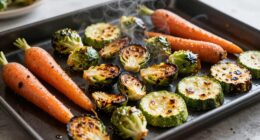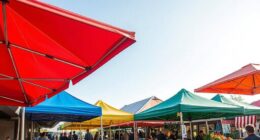As a juice enthusiast, I recognize the importance of having a refreshing glass of freshly squeezed juice on hand at all times. But what should you do if unexpected events occur and you forget to put your juice back in the fridge? Is it still okay to drink? How long can juice be left unrefrigerated before it goes bad?
The answer to this question is crucial for anyone who enjoys drinking juice regularly. Let’s face it, nobody wants to drink spoiled juice that could potentially make them sick.
In this article, we will explore the factors that affect the shelf life of juice, how long fresh and store-bought juice can stay out of the fridge, signs of spoiled juice, and tips for properly storing juice to keep it fresh for as long as possible.
So, if you’re a juice enthusiast like me, keep reading to learn everything you need to know about keeping your juice fresh and safe to drink.
Key Takeaways
- Juice should be stored in the fridge to maintain quality, prevent contamination, and extend shelf life.
- Harmful bacteria can grow in juice left out for too long, so fresh juice should be refrigerated below 40°F as soon as possible after juicing.
- Proper pasteurization can kill harmful bacteria and extend shelf life, allowing properly pasteurized juice to stay fresh for several months in a cool, dry place.
- Unopened store-bought juice can last for several months, but once opened, it should be refrigerated and consumed within 7-10 days. Homemade juice should be consumed within 24-48 hours of making it.
The Importance of Proper Juice Storage
You gotta make sure you store your juice properly if you want it to stay fresh and delicious for as long as possible! Juice preservation techniques are important because they help maintain the quality of the juice, prevent contamination, and extend its shelf life.
Proper storage also ensures that the juice retains its nutritional value and taste. The importance of juice freshness cannot be overstated. Fresh juice is not only more flavorful but also healthier because it contains more nutrients.
The best way to preserve the freshness of juice is by storing it in the refrigerator. However, there are other factors that affect the shelf life of juice, including the type of juice, the packaging material, and the temperature at which it is stored.
Factors That Affect the Shelf Life of Juice
When it comes to determining the shelf life of juice, there are several factors to consider. Firstly, the type of juice can significantly affect its longevity. For instance, citrus juices tend to have a shorter shelf life compared to apple or grape juice.
Secondly, the temperature of the environment also plays a crucial role in determining the shelf life of juice.
Finally, pasteurization is another critical factor that affects the shelf life of juice. Proper pasteurization can help extend the shelf life of juice, while improper pasteurization can lead to spoilage.
Type of Juice
If it’s freshly squeezed, orange juice can last up to two hours outside of the fridge before it starts to spoil. However, this timeframe may differ depending on the type of juice.
For example, fruit juices that are not freshly squeezed and have preservatives can last up to a few days at room temperature. On the other hand, vegetable juices, especially those that are freshly made, have a shorter shelf life and should be consumed within a few hours of being made.
Juice expiration and preservation are also affected by the packaging. Juice that is sealed in airtight containers or tetra packs can last longer outside of the fridge compared to juice that is exposed to air.
However, it’s important to note that even if the juice is still safe to drink, the taste and quality may be compromised if it’s left out for too long. Therefore, it’s always best to store juice in the fridge to maintain its freshness and quality.
This brings us to the next subtopic, the temperature of the environment and how it affects the shelf life of juice.
Temperature of Environment
Maintaining the proper temperature is crucial in preserving the freshness and flavor of your favorite juice. The optimal temperature for most types of juice is below 40°F or 4°C, which is the temperature of a refrigerator. When juice is stored at room temperature, it can quickly become a breeding ground for bacteria that can cause spoilage, fermentation, and discoloration.
Here are some emotions that you might experience if you don’t properly store your juice:
- Frustration: You might feel annoyed when you realize that your juice has gone bad because you left it out of the fridge too long.
- Disappointment: You might feel sad when you have to throw away a half-full carton of juice because it has gone sour.
- Regret: You might feel remorseful when you realize that you could have prevented the waste of money and resources by simply putting your juice in the refrigerator.
In addition to affecting the quality of your juice, the temperature of the environment can also impact its safety. When juice is left out for too long, harmful bacteria like E. coli and Salmonella can grow and make you sick. To avoid this risk, it’s important to always store your juice in the refrigerator and discard any juice that has been left out of the fridge for more than 2 hours.
Moving on to the next section about pasteurization, it’s worth noting that even pasteurized juice can spoil if it’s left out of the fridge for too long. Pasteurization can kill most of the harmful bacteria in juice, but it doesn’t sterilize it completely. Therefore, it’s still important to follow the proper storage guidelines to ensure that your juice stays fresh and safe to drink.
Pasteurization
Properly heating juice through pasteurization is essential to ensure that it remains fresh and safe for consumption. This process involves heating the juice to a specific temperature for a set amount of time to kill any harmful bacteria and extend the shelf stability of the juice. The table below shows the recommended pasteurization temperatures and times for different types of juice:
| Juice Type | Temperature | Time |
|---|---|---|
| Apple | 194°F (90°C) | 1 minute |
| Orange | 162°F (72°C) | 15 seconds |
| Grape | 176°F (80°C) | 30 seconds |
| Pineapple | 160°F (71°C) | 25 seconds |
| Cranberry | 185°F (85°C) | 20 seconds |
Juice pasteurization not only helps to kill harmful bacteria, but it also extends the shelf stability of the juice. Properly pasteurized juice can stay fresh and safe for consumption for up to several months, provided that it is stored in a cool, dry place away from direct sunlight. However, it is important to note that once the juice is opened, it should be refrigerated and consumed within a few days to ensure its freshness and safety.
So, how long can fresh juice stay out of the fridge? Let’s explore this in the next section.
How Long Can Fresh Juice Stay Out of the Fridge?
You can leave fresh juice out of the fridge for up to two hours before it starts to spoil. This is because fresh juice is unpasteurized and contains natural bacteria that can cause spoilage. The shelf life of fresh juice at room temperature is limited, and it’s best to consume it as soon as possible to avoid the risk of foodborne illness.
To ensure maximum freshness and safety, it’s recommended to store fresh juice in a refrigerator below 40°F as soon as possible after juicing. This will extend its shelf life to up to three to five days. Additionally, it’s important to use clean utensils and equipment when juicing to prevent contamination and spoilage. Always wash fruits and vegetables thoroughly before juicing to remove any harmful bacteria.
When it comes to store-bought juice, the rules are a little different. Stay tuned to learn how long store-bought juice can stay out of the fridge before it spoils.
How Long Can Store-Bought Juice Stay Out of the Fridge?
If you forget to refrigerate store-bought juice, it can quickly become a breeding ground for harmful bacteria. The shelf life of store-bought juice varies depending on the type of juice and whether it has been opened or not.
Unopened juice can last for several months if stored in a cool, dry place away from direct sunlight. However, once the container has been opened, the juice should be refrigerated and consumed within 7-10 days to prevent spoilage.
Juice storage tips are important to keep in mind to ensure that your juice stays fresh for as long as possible. It’s best to store juice in a glass or plastic container with an airtight lid to prevent exposure to air and bacteria. Additionally, store the juice in the coldest part of the refrigerator, which is typically the back of the bottom shelf.
When it comes to homemade juice, it’s important to consume it within 24-48 hours of making it to prevent spoilage. With these tips in mind, you can ensure that your juice stays fresh and safe to consume.
As important as it is to know how long juice can last, it’s equally important to know the signs of spoiled juice.
Signs of Spoiled Juice
When your juice has turned, it’s time to bid it farewell and toss it out. Spoiled juice can cause gastrointestinal problems, and it can also be a breeding ground for bacteria. One of the common contaminants in spoiled juice is mold, which can cause allergic reactions or respiratory problems. Other contaminants include yeast and harmful bacteria like E. coli and Salmonella.
To prevent juice spoilage, it’s important to practice good hygiene when handling juice. Always wash your hands before preparing or serving juice, and make sure the juicer or blender is properly cleaned and sanitized. Store juice in an airtight container and refrigerate it promptly after opening.
Additionally, avoid leaving juice out in the open for too long, especially in warm temperatures. By following these simple ways to prevent juice spoilage, you can enjoy fresh and healthy juice for a longer period of time.
Now that you know the signs of spoiled juice and how to prevent it, let’s move on to tips for properly storing juice.
Tips for Properly Storing Juice
Properly storing your favorite juice can ensure its freshness and delicious taste for a longer period, giving you the satisfaction of enjoying every sip.
One of the most important factors to consider when storing juice is the container it is stored in. It’s recommended to use a glass container as it doesn’t react with the juice and doesn’t contain any harmful chemicals. Additionally, ensure that the container is tightly sealed to prevent the entry of air, which can cause the juice to spoil quickly.
Another crucial factor to consider when storing juice is the storage location. The best location to store juice is in the refrigerator. This is because the low temperature slows down the growth of microorganisms that cause spoilage.
It’s also important to check the expiration date and label of the juice before storing it. Ensure that the juice is stored before the expiration date and that the label indicates it is safe to consume.
When juice is not stored properly, it can go bad and pose health risks. In the next section, we’ll discuss how to tell if juice has gone bad without taking any steps.
How to Tell If Juice Has Gone Bad
Detecting spoiled juice is crucial to avoid potential health risks, so knowing how to identify signs of spoilage is essential. Here are three ways to tell if juice has gone bad:
-
Look for changes in color and texture. Fresh juice should be vibrant and smooth, but if it starts to look cloudy or has developed a grainy texture, it’s a sign that bacteria or mold have started to grow.
-
Smell the juice. If it has a sour or fermented odor, it’s likely that the juice has started to spoil. Fresh juice should have a clean, fruity aroma.
-
Taste a small amount. If the juice tastes off or has a strange aftertaste, it’s a sign that it has started to spoil. Fresh juice should taste sweet and refreshing.
Drinking fresh juice has numerous benefits, from providing essential vitamins and minerals to boosting immune function and promoting healthy digestion. However, if juice is left out of the fridge for too long and goes bad, it can pose serious health risks.
In the next section, we’ll explore potential health risks of drinking spoiled juice.
Potential Health Risks of Drinking Spoiled Juice
It’s important to be aware that drinking spoiled juice can lead to serious health risks, such as food poisoning, which affects millions of people each year and can cause symptoms like nausea, vomiting, and diarrhea. Common contaminants in juice include bacteria, mold, and yeast, which can grow and multiply over time, especially when exposed to warm temperatures. The longer juice sits out of the fridge, the higher the risk of contamination.
To prevent contamination, it’s important to follow safe handling practices, such as washing your hands before handling juice and using clean utensils and containers. Additionally, it’s important to store juice in the fridge at a temperature of 40°F or below and to consume it within 7-10 days of opening. If you suspect that your juice has gone bad, it’s best to discard it rather than risking your health. Consuming spoiled juice can not only lead to discomfort and illness, but it can also have potential legal consequences if a manufacturer is found to have sold unsafe products. Vulnerable populations, such as pregnant women, children, and the elderly, are at higher risk of developing serious complications from food poisoning related to spoiled juice.
When it comes to juice safety, it’s important to separate fact from fiction. Common myths about juice safety include the belief that adding alcohol or lemon juice can prevent spoilage, or that the expiration date on the label is just a suggestion. However, none of these methods are effective in preventing contamination or extending the shelf life of juice. As an alternative to drinking expired juice, consider making fresh juice at home or purchasing smaller containers that can be consumed within a shorter time frame. If you do experience symptoms of food poisoning related to spoiled juice, seek medical treatment promptly to prevent complications.
Transitioning into the subsequent section about what to do with leftover juice, it’s important to consider ways to minimize waste without compromising safety.
What to Do with Leftover Juice
Want to make the most of your leftover juice? Here are some creative ways to use it up and add flavor to your meals and drinks.
Instead of letting that leftover orange juice go to waste, try mixing it with olive oil, vinegar, and herbs to make a flavorful salad dressing. You can also use leftover fruit juice to make smoothies or cocktails, adding a burst of natural sweetness and nutrients to your drinks.
Another great way to use up leftover juice is to create unique juice blends. For example, mix orange and cranberry juice for a tangy and refreshing drink, or combine apple and carrot juice for a healthy and delicious blend.
You can even freeze leftover juice into ice cubes and use them to add flavor to water or other beverages. Don’t let your leftover juice go to waste get creative and enjoy the benefits of fresh, flavorful juice in new and exciting ways!
Frequently Asked Questions
Can I freeze leftover juice?
Yes, leftover juice can be frozen to minimize waste. It is best to transfer the juice to an airtight container, leaving some room for expansion, and freeze immediately. Thaw in the fridge before consuming.
How can I tell if juice is still good after it has been refrigerated for a few days?
On average, juice has a shelf life of 3-5 days in the fridge. Signs of spoilage include a sour smell, off taste, or mold. Always check for these before consuming leftover juice.
Does the type of container I store my juice in affect its shelf life?
The type of container used to store juice can affect its shelf life. Glass containers provide the best protection against air and light, while plastic and paper containers are more permeable. Storage temperature also plays a crucial role in maintaining juice quality.
Can I mix different types of juice together and still store them safely?
Mixing juices can be safe if done correctly. Consider taste preferences and possible reactions between juices. However, it’s important to note that mixing doesn’t affect the shelf life of the juices, which still need to be refrigerated.
Is it safe to drink juice past its expiration date if it still looks and smells okay?
Drinking expired juice can pose potential dangers to one’s health, regardless of its appearance or smell. Shelf stability and expiration dates are determined by the type of juice and its processing method.
Conclusion
Overall, it’s important to properly store juice in order to maintain its freshness and avoid potential health risks. Freshly squeezed juice can stay out of the fridge for up to two hours. Store-bought juice should be refrigerated immediately after opening and can last for up to seven days in the fridge. Signs of spoiled juice include a foul odor, off-taste, and discoloration.
Interestingly, research has found that the average American consumes approximately 6.6 gallons of fruit juice per year. That’s enough to fill up a standard bathtub!
It’s important to remember that while juice can be a healthy and refreshing beverage choice, it must be stored properly and consumed before its expiration date to avoid potential health risks. By following proper storage guidelines and staying aware of signs of spoilage, we can enjoy our favorite juices safely and deliciously.









